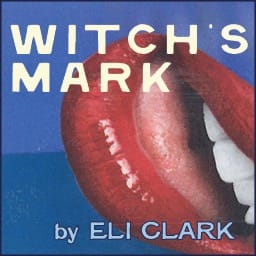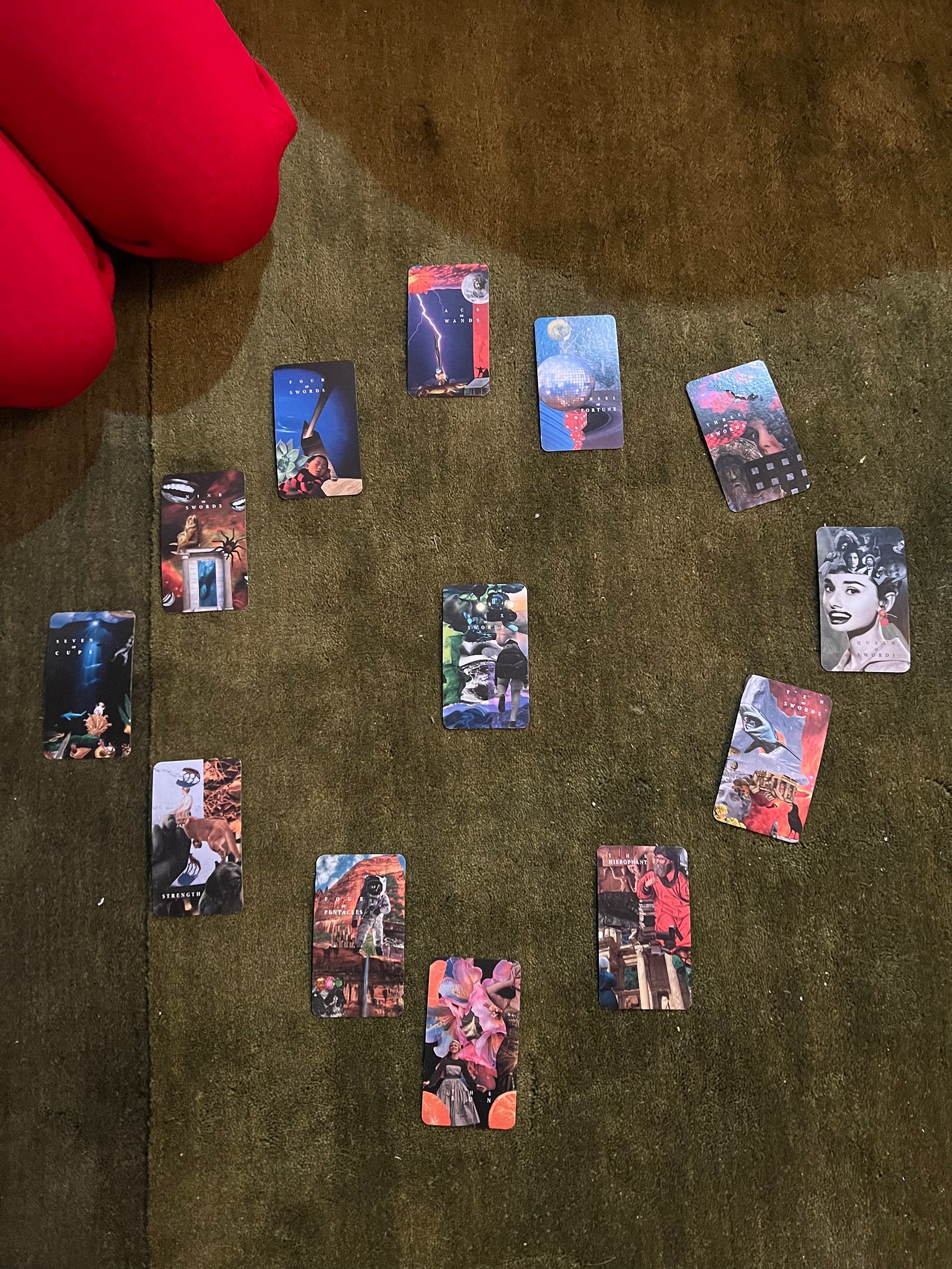Welcome To Witch's Mark

When I was pregnant with my first child, I bought and read exactly one book about parenting. The book was called Relax, It’s Just God: How and Why To Talk To Your Kids About Religion When You’re Not Religious, written by Wendy Thomas Russell.
I did not read about diapering or sleep training or attachment theory. I did not subscribe to the RYE method or have strong views about pacifiers. But in retrospect, I can see I was terrified, even then, almost a decade before I would even admit to myself that there might be something more to life than what we can see. Terrified of what, you could ask. Don’t you know that newborn babies have no concept of object permanence, much less God? Don’t you know that there will be many difficult things about having a newborn, and none of them will have anything to do with what happens to us after we die?
Ever since I was the smallest version of myself, I have believed in (and desperately wished to believe in) magic. This did not always come easily for me. My father likes certainty. He will answer the questions of small children with bravado regardless of the subject. He was a reassuring presence in my childhood, in part, because, in the absence of God, he became one to me. He would take my brother and me up on the hill behind our grandparents house in Vermont, a place where you could still see stars, and he would opine about the beauty of the universe, about our insignificant place in it, the brilliant mistake of our existence (“Only slightly to the left or right in space and our planet wouldn’t have water or oxygen and would not be able to sustain life”).
My mother was raised Catholic by a devout mother of five (“Your grandmother was a saint” - my dad) and a Naval officer. Mom was a wild woman, a child with undiagnosed ADHD, the youngest of five siblings with energy and creativity her parents had no idea how to contain. The god of her childhood was omnipotent and generally disapproving. There were many things to feel guilty about and ashamed of, and the only way to be good was to feel guilty and ashamed, and then to confess. It didn’t really work for my mom, and it definitely didn’t work for me.
We went to church to please my maternal grandmother, though my parents never made it seem like believing was something they needed or wanted from us. I don’t remember ever truly believing in God, and as I got older, my ideas hardened into what I sometimes now refer to as Fundamentalist Atheism. Fundamentalist because, like other fundamentalist ways of thinking, my worldview did not allow for the sliver of a possibility that I might be wrong. I spent a good deal of my life knowing that anyone who believed in anything that they could not see or prove was an absolute moron.
And yet, here you are, reading a newsletter I’ve devoted entirely to the Tarot- a witchy, woo-woo divination tool… how does that square with my permanent internal eye roll about belief in things we cannot see? How did I come to the Tarot? What do I believe it’s powers to be? Do I believe in it?
But first things first: what is The Tarot? Tarot is a deck of 78 cards. It is divided into three sections — The Major Arcana, the Minor Arcana, and the Court Cards. The Major Arcana, where we will begin, consists of 22 cards that represent a journey. You begin as The Fool and end with the triumph of The World, and then, you begin again. These cards represent big archetypal life moments (you could map this journey into Joseph Campbell’s The Hero’s Journey if you were so inclined, and for that matter, you could do it with Star Wars, or a million other stories). The Minor Arcana has four suits like a regular deck of cards — cups (hearts), wands (clubs), swords (spades), and pentacles (diamonds). Each suit tells a story about a particular realm of human life — cups are about relationships and emotions, wands are about creativity and the mind, swords are about communication and conflict, pentacles are about the physical body and the material world. There are four court cards in each suit — page, knight, queen, and king — and they represent specific people, energies, personalities. But we don’t need to get ahead of ourselves. Stick with me, and we’ll make our way through the whole story.
I came to the Tarot in desperation. In January of 2022, I quit drinking after a long and storied drinking career. I had quit before, sometimes for a year at a time, and yet, I had always returned, feeling deprived (Who would voluntarily choose to give up something that brings that much pleasure and relief?), and so I would get back to it with reckless abandon.
Nobody told me I needed to quit. In fact, most people I told about my newfound abstinence were like, and I quote: “Wait, what?” I have always proudly held my liquor and I probably could have continued drinking for another decade at least before anyone staged an intervention. But I could feel its grip on me, and I hated the shame I would wake up with, and the incessant whisper in my head to solve anything (sadness, boredom, a cold) with a drink.
By January 2022, there was another small voice inside of me urging me to take it seriously, to acknowledge that even if I wasn’t hurting others, I was absolutely hurting myself, that I was a person worth caring for. The quietest part of that inner voice had another message for me, one I had tried to ignore for as long as I can remember. Somehow, in spite of myself, I knew there was a spiritual wound that needed healing.
Even now, typing the words “Spiritual wound” makes my whole body break out into douche chills, but THAT IS WHAT IT WAS, and if you’re rolling your eyes YOU MIGHT HAVE ONE TOO.
Religion, God, or even Tarot were never going to be things I could just choose to believe in. My upbringing, my worldview, my personality… whatever it is that makes me a skeptic, it’s deeply engrained. But to me, Tarot feels like a first date with your inner most self. You shuffle the cards, you place your feet on the ground, and then you pick some cards. Maybe you pick them by waving your hand over them until you feel heat, maybe that’s a bridge too far, and so instead, you pick them at random. And then you lay them out before you and interpret a story.
So you’ve picked the five of cups, for example, a card that signifies grief. Cups are the suit of water, relationships, emotion. So the grief here is bone deep, a loss of a relationship, maybe, to someone else or even to yourself. But, you think, what am I grieving? I don’t think I’m grieving anything… so you begin to search your brain, and here’s where the first date with your inner most self begins. In what areas are you grieving? Maybe it’s about something that is happening in the world, maybe it’s a dream you had for yourself, or a creative project that disappointed, a person who has died, or a relationship you’ve lost or that has changed. And it is that inventory, those questions that you ask yourself, that makes the Tarot magic.
Do I believe that the deck is animate, that it literally wants you to know something, that it can predict the future? I mean, no, probably not, right? Though there have been many spooky readings that have sent a little shiver down my spine, I generally do not believe that inanimate objects have feelings or desires. But, unlike the ouija board, or a spooky ghost story around a campfire, I also do not think that the Tarot is a party trick or a game. I believe in what Tarot has to tell us about ourselves, or rather, I believe in the conversation that is being facilitated by the cards between the reader and the querent.

Each card represents an idea, a feeling, a person, an archetype. When arranged, these pieces begin to tell a story. The story must be read, interpreted by a person, either yourself or someone else. My favorite readings are conversations between the cards, the reader and the subject. Questions raised by the cards are occasionally answered by the cards, but more often than not, they are answered in a conversation between the reader and the querent. The cards are simply a tool for that conversation.
I am often surprised by how perfect random cards can be, how clearly they tell a story about my life — about the things I wish for, the things I want to forget. I can’t always make the leap to say that I have chosen those cards for some divine reason. Perhaps it is all just coincidence. To me, that doesn’t make it any less powerful.
It is important to have conversations with ourselves. Our bodies and our minds make up stories all day. Sometimes our bodies remember what our brains want to forget. The tarot is a tool for discovery. It’s a storytelling tool, a way to make sense and meaning out of chaos.
And it has completely changed my life.
Which brings me to this publication. I am a writer and showrunner. My medium is television, theater, and film. For the past couple of years I’ve also been studying Tarot and witchcraft as a creative tool, and it has kept me from succumbing to the dystopian capitalist hellscape that is the business of Hollywood. It has kept me feeling creative even through periods of frustration with the business, and for that matter, frustrations, fears, and anxieties about all aspects of my life. It’s also a huge reason why on January 17, it will be two years since I had my last drink. It’s powerful stuff, is what I’m saying.
I’m not going to teach you the Tarot, because there are people who are far better equipped for that. I recommend Between The Worlds - a podcast hosted by Amanda Yates Garcia and produced by Carolyn Pennypacker Riggs, Seventy-Eight Degrees of Wisdom by Rachel Pollack, or Tarot for Yourself by Mary K Greer.
What I am going to do is move my way through the Tarot by telling a story that is thematically linked to the card, or rather, what the card means to me. I’ll use it as a jumping off point to tell a story, and maybe give you some suggestions of work in other mediums that speak to that theme (for example, a playlist). So you don’t have to give a single shit about tarot to come on this journey with me, though you certainly can (I do! I give so many shits!). I promise I’ll be truthful and occasionally funny. I’ll be vulnerable and earnest too — two things I’ve only recently stopped trying to snuff out of my personality entirely.
My first book recommendation is Quit Like A Woman: The Radical Choice To Not Drink In A Culture Obsessed With Alcohol by Holly Whitaker. This book completely reframed the decision to quit for me, and I have recommended it to multiple friends who have successfully quit too.
Join me. Every Monday morning, you’ll get this little newsletter in your inbox, and I’ll deep dive into stories on the theme of that card. You’ll also get playlists and recommendations for art in other mediums that speak to the theme (and I really hope you’ll add your recs in the comments!).
Next Monday, we’ll meet The Fool, the first card in the Major Arcana (0), and our wild journey will begin.
